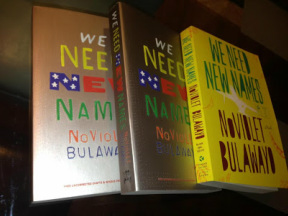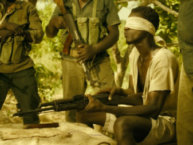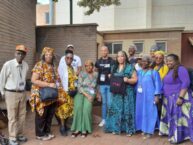
- The British and American editions of NoViolet Bulawayo’s “We Need New Names”
Utilizing the innocence and viciousness of child’s play, NoViolet deftly weaves social commentary into Darling’s narration, creating an emotional, sometimes empathetic, and sometimes-visceral connection, between the reader and each character. Darling and her friends’ daily misadventures in Paradise and affluent Budapest elicit laughter but that laughter is tempered by the fact that their education had unceremoniously been interrupted. Silent eleven-year old Chipo and her growing belly challenge us as we face incest and child sexual abuse, and yet she carries on playing with her friends.
Darling’s previously absentee father, in a fleeting interaction with Darling and her friends, offers a moving glimpse into HIV and AIDS-related stigma, while the Fambeki prophet, in his finery evokes anger in his unscrupulousness as a religious leader who preys on his oft desperate followers, taking their dignity and money. And how can one not applaud MotherLove’s rejection of voyeuristic NGOization veiled in pity-laced good deeds? Then there is freedom-seeking Bornfree, whose brutal and public murder breaks our hearts, even though we saw it coming.
Circling back to Darling who leaves Paradise for America, we feel her disappointment and longing for home as she finds herself in a place quite different from the one in her imagination, a place where being different and the effort to belong can be painful. We then witness Darling unknowingly become “an illegal” and grudgingly join the millions of nowhere people who straddle two worlds but do not fully belong in either. So, while Darling leads us through otherwise heavy subject matter, the dialogue and interpersonal encounters throughout maintain a light-hearted tone that is believable and resonates with readers, particularly those who are Diasporans. Darling no-doubt leaves us with unanswered questions, but I for one hope that perhaps they will be answered in a future offering.
The Reviewer







1 comment for “Rufaro Gwarada Reviews “We Need New Names””